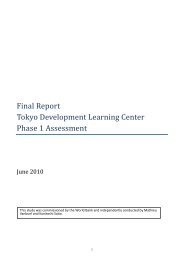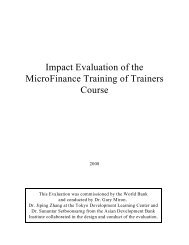JICA-Net - Tokyo Development Learning Center
JICA-Net - Tokyo Development Learning Center
JICA-Net - Tokyo Development Learning Center
You also want an ePaper? Increase the reach of your titles
YUMPU automatically turns print PDFs into web optimized ePapers that Google loves.
GDLN EAPA<br />
Hanoi Meeting, 2005<br />
July11, 2005<br />
<strong>JICA</strong>-<strong>Net</strong> and Partnership<br />
with GDLN<br />
Japan International Cooperation Agency<br />
TAMBOIchiro
Outline<br />
<strong>JICA</strong> – Who are we?<br />
<strong>JICA</strong>’s ICT Policy<br />
<strong>JICA</strong>-<strong>Net</strong><br />
Collaboration with GDLN<br />
Innovation and Possibilities<br />
Personal Views
1. <strong>JICA</strong>Who are we?<br />
Japan International Cooperation Agency (<strong>JICA</strong>)<br />
= Government Independent Agency<br />
for Technical Cooperation<br />
Staff: 1,324 (end of fiscal 2003)<br />
Overseas Offices and Representatives;<br />
Domestic Offices: 19 offices<br />
Overseas Offices: 56 offices<br />
Annual Budget: JP \161.2 billion (2004)
ODA and <strong>JICA</strong><br />
(ODA: Official <strong>Development</strong> Assistance)
2. <strong>JICA</strong>’s ICTs for <strong>Development</strong> Policy<br />
1Japanese Government<br />
“Comprehensive Cooperation Package to<br />
Address the International Digital Divide”<br />
Prior to the Kyushu-<br />
Okinawa Summit in 2000<br />
Digital Divide
(2) Approaches for Systematic Planning<br />
of ICT <strong>Development</strong> Project<br />
<strong>Development</strong> Objectives
Objective 1<br />
Strengthen Capacity for ICT Policy<br />
Formulation<br />
• Establishment of Telecommunications Policy<br />
• Establishment of Policy to Foster ICT Industry<br />
• Establishment of Policy to Eliminate Domestic<br />
Digital Divides<br />
• User Protection<br />
Dispatching ICT Advisor,<br />
<strong>Development</strong> Study
Objectives 2<br />
Human Resources <strong>Development</strong> in<br />
ICT<br />
• ICT Analysts, Designers, Project<br />
Managers and Instructors<br />
• Policy Makers<br />
Sri Lanka<br />
Technical Cooperation Project<br />
Technical Training in Japan<br />
Volunteer Activities
Human Resources <strong>Development</strong> in ICT<br />
Examples of Projects<br />
<strong>Development</strong> of System Analyst, Designer,<br />
Project Manager and Instructors<br />
Technical Cooperation Project<br />
Singapore, Malaysia,<br />
Thailand,<br />
Philippines, Vietnam,<br />
China, Sri Lanka,<br />
Argentina, Jordan<br />
Jordan
Human Resources <strong>Development</strong> in ICT<br />
Examples of Projects 2<br />
Distance Education<br />
Projects<br />
• Fiji, Malaysia<br />
Objectives<br />
• ICT Higher Education to Rural<br />
Area by Distance Education<br />
One Solution to Education in Rural Area
Human Resources <strong>Development</strong> in ICT<br />
Examples of Activities <br />
E-learning / Multimedia Materials<br />
Projects<br />
• Sri Lanka, Thailand<br />
Objectives<br />
• Multimedia Production<br />
Technique for e-<strong>Learning</strong><br />
(Sri Lanka)<br />
• Secondary teachers‘ skill of<br />
teaching ICT in rural area<br />
(Thailand)
Objective 3<br />
Improvement of Telecommunication<br />
Infrastructure<br />
• Provision of Telecommunication<br />
Infrastructure<br />
• Fostering Internet Service Provider<br />
• Provision of Access Point<br />
Grant Aid<br />
<strong>Development</strong> Study
Objective 4<br />
Improvement of Efficiency and<br />
Effectiveness of Every Sector through<br />
the Use of ICT<br />
• Promotion of e-Government<br />
• Promotion of the Use of ICT in Every Sector<br />
Cooperation will be implemented by <strong>JICA</strong><br />
Department of Each Sector
Objective 5<br />
Improvement of Efficiency and<br />
Effectiveness of <strong>Development</strong><br />
Assistance through the Use of ICT<br />
• Dissemination and Transfer of Existing<br />
Knowledge<br />
• Sharing and Creation of Knowledge and<br />
Experience<br />
• Use of ICT in Project Implementation<br />
<strong>JICA</strong>-<strong>Net</strong> ;<br />
Video Conference and Distance Education System
3. <strong>JICA</strong>-<strong>Net</strong> supports <strong>JICA</strong>’s Programs<br />
(1) What is it?<br />
Video conference and<br />
Distance Education System<br />
<br />
To improve <strong>JICA</strong>’s overall technical<br />
cooperation programs through:<br />
▶ effectiveness<br />
▶ efficiency<br />
by real time and two-way<br />
communication tool
(2) What kind of services?<br />
FourFeatures<br />
Distance Training<br />
– lectures and seminars<br />
Multimedia Contents<br />
WBT<br />
Video conferencing
Framework of the<br />
<strong>JICA</strong>-<strong>Net</strong> Program<br />
Consultation<br />
Discussion, Monitoring<br />
Seminar, Lecture<br />
<strong>JICA</strong>-<br />
<strong>Net</strong><br />
Lecture,<br />
Follow-up<br />
RECIPIENT<br />
COUNTRIES<br />
3rd Country<br />
Training<br />
Participants<br />
JAPAN<br />
Acceptance of Trainees<br />
Dispatch of Experts<br />
Project-type Tech. Co-op.<br />
Dispatch of JOCVs<br />
RECIPIENT<br />
COUNTRIES
Typical scenes on <strong>JICA</strong>-<strong>Net</strong><br />
Philippines<br />
Malaysia<br />
Indonesia<br />
Lecture and materials<br />
on two screens<br />
Live lecture / seminar<br />
<strong>Tokyo</strong><br />
Okinawa<br />
Live lectures<br />
Government officials,<br />
counterparts, etc.<br />
Q & A
Inauguration and Expansion<br />
• Services started in April, 2002.<br />
• Existing stations as of June, 2005.<br />
<strong>JICA</strong> HDQ<br />
Domestic18<br />
Overseas35<br />
• Additional stations to be established<br />
by end March 2006<br />
Overseas<br />
23(8)<br />
Total77 incl.<br />
HDQ
<strong>JICA</strong>-<strong>Net</strong> Stations by Region<br />
• <strong>JICA</strong> HDQ <strong>Tokyo</strong><br />
• Domestic18<br />
• Overseas<br />
ASIA=Indonesia, Cambodia, Thailand, Philippines,<br />
Vietnam, Malaysia, Laos, China, Sri Lanka,<br />
Pakistan, Bangladesh, Nepal, Uzbekistan,<br />
(India), (Myanmar), (Mongolia)<br />
PACIFIC=Fiji<br />
AFRICA=Kenya, Zambia, Ghana, Senegal,<br />
South Africa, Malawi, Tanzania, (Ethiopia),<br />
AMERICA=Costa Rica, Mexico, Argentina, Paraguay,<br />
Bolivia, Brazil, El Salvador
Achievements (1)<br />
• No of Benefited / Service Hours<br />
!&%%%<br />
!%%%%<br />
$&%%%<br />
/,.0120<br />
314.0<br />
!%#$' !%(%%<br />
$%%%%<br />
#&%%%<br />
#%%%%<br />
&%%%<br />
%<br />
#%&"&<br />
!"#$<br />
!#)(*' !($%*%<br />
(#)*( #&")*"<br />
$%%$ $%%! $%%) $%%&<br />
+,-.
Achievements (2)<br />
• No of lectures/seminars, multimedia<br />
contents and WBT courses.<br />
" ) $<br />
" ' $<br />
" & $<br />
4-5/63.7.-89:23.<br />
864/98-;92?@
<strong>JICA</strong>-<strong>Net</strong> and GDLN <strong>Center</strong>s<br />
Japan<br />
East Asia & the Pacific<br />
South Asia<br />
Europe & Central Asia<br />
Latin America & Caribbean<br />
Middle East & North Africa<br />
North America<br />
Sub-Saharan Africa<br />
Total<br />
<strong>JICA</strong>-<strong>Net</strong><br />
20<br />
10<br />
5<br />
3<br />
6<br />
3<br />
0<br />
7<br />
54<br />
GDLN<br />
1<br />
13<br />
3<br />
21<br />
20<br />
9<br />
3<br />
10<br />
80
Location Map
4. Collaboration with GDLN<br />
(1) Presidents acknowledged<br />
the importance of connecting the <strong>JICA</strong>-<br />
<strong>Net</strong> and the GDLN and the need to build<br />
even closer relations in order to deepen<br />
knowledge sharing not only in Asia but<br />
also around the world at the launch of the<br />
TDLC in June 2004.<br />
The TDLC has been playing a key role in<br />
promoting the collaboration with the<br />
GDLN.
4. Collaboration with GDLN<br />
(2) MOU between VPs<br />
Signed on Nov. 16, 2004.<br />
The objectives are:<br />
a. Enhancing distance learning<br />
activities through the mutual use of the<br />
<strong>JICA</strong>-<strong>Net</strong> and IBRD/GDLN facilities for<br />
development and poverty reduction;<br />
b. Undertaking collaborative distance<br />
learning for capacity building activities;<br />
and<br />
c. Promoting and sharing Japan’s<br />
knowledge and experience to<br />
developing countries around the world.
4. Collaboration with GDLN<br />
(3) On-going collaboration<br />
<br />
<br />
<br />
Staff Secondment<br />
Promoting mutual information exchange and<br />
understanding through the staff secondment.<br />
Program Exchange<br />
Delivering available programs from the <strong>JICA</strong>-<strong>Net</strong><br />
to the GDLN and vice versa to increase the<br />
outreach of beneficiaries or share readily available<br />
contents for distance learning.<br />
Program <strong>Development</strong><br />
Promoting program identification for joint<br />
contents development and delivery it.
Example 1:<br />
Collaboration with WBI and TDLC<br />
WBI and <strong>JICA</strong>-<strong>Net</strong> trained <strong>JICA</strong> and Bank<br />
counterpart project staff in AFR,SA,EAP through<br />
jointly developed contents.<br />
2004<br />
Managing Project Monitoring and Evaluation<br />
2005<br />
Management Focused Monitoring and<br />
Evaluation, Performance Indicators,<br />
Qualitative Measures<br />
Collaborators:<br />
World Bank Institute, TDLC, <strong>JICA</strong> <strong>Tokyo</strong>
Example 2 :<br />
Disaster Management<br />
World Conference on Disaster Reduction in Kobe<br />
Collaborators:<br />
The United Nations,<br />
Japanese Government,<br />
TDLC, <strong>JICA</strong> Indonesia Office<br />
Tsunami Early Warning System<br />
21 Government Representatives from 11<br />
Tsunami-Affected Countries Work On Early<br />
Warning System Via GDLN<br />
Collaborators: TDLC, <strong>JICA</strong> <strong>Tokyo</strong>
Example 3 :<br />
Kids Program through GDLN<br />
<strong>JICA</strong> Okinawa joined “Kids Initiative” Program.<br />
Mongolia & Japan May 18, 2005<br />
Thailand & Japan Mar 28, 2004<br />
Collaborators:<br />
TDLC,<br />
Sri Lanka DLC,<br />
Mongolia DLC,<br />
Thailand DLC,<br />
<strong>JICA</strong> Okinawa
5. Win-Win Collaboration<br />
Personal Views<br />
GDLN<br />
Linkage to the<br />
Bank’s lending<br />
operations<br />
Contents with<br />
broader<br />
development issues<br />
GDLN <strong>Center</strong>s<br />
Innovations<br />
TDLC<br />
Possibilities<br />
<strong>JICA</strong>-<strong>Net</strong><br />
Linkage to<br />
<strong>JICA</strong>’s TA activities<br />
Contents with emphasis<br />
on engineering and<br />
practicalities<br />
<strong>JICA</strong>-<strong>Net</strong> <strong>Center</strong>s
Thank you !<br />
For further information:<br />
www.jica.go.jp<br />
www.jica-net.com<br />
Tambo.Ichiro@jica.go.jp
















